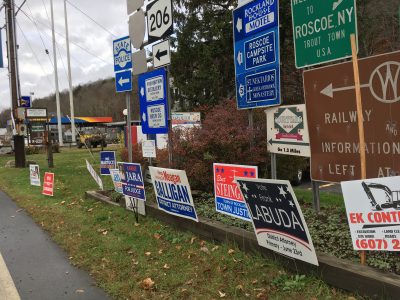It’s Only a Lawn Sign; Well, Perhaps Far More. How Being ‘a Minority’ Feels

With quarrels raging over disappearing campaign lawn signs, rattled American liberals may now appreciate how being ‘a minority’ feels.
Desecration and theft of lawn signs in support of Republicans or Democrats are reported in many American neighborhoods this year, with Democrats being particularly unsettled by what they regard as an existential threat. (Although their experience surrounding this issue is trifling compared to what Muslims, Black, and Jewish minorities historically encountered, and still face.)
I appreciate the panic aroused by gatherings of armed Trump supporters and other menacing actions, most recently against Biden’s bus. But perhaps fears manifest around lost lawn signs by these mainly white middle class folks are exaggerated and misplaced.
One local upstate N.Y. paper tactfully addresses the problem of stolen campaign posters with “When political signs disappear”. It may have adopted this approach to temper overstated calls for help.
I agree that anything stolen off one’s manicured lawn is upsetting. But, hey: it’s only a two-foot square paper poster pushed into the turf– a rather timid expression of one’s political leanings.
From reports of thefts I’ve tracked in my county, local police (often mistakenly perceived as solidly allied with ‘conservatives’) swiftly responded, charging two suspects—in one case a known teenage vandal, in the other, sole 20-year old. There was no indication of armed vigilantes shooting up Democratic neighborhoods or defacing homes. Although unfounded rumors prompted some Democratic supporters to remove their signs or spurn the suggestion they host one. (“I think I’ll pass this year”, or “Let me think about it.”) True, some signs were stolen or dislodged. But crying “I felt violated!”, as one householder wrote on a community website about a stolen poster. Really? What about brave citizens who film police wantonly brutalizing and murdering our Black men in the street?
The current dilemma over lawn signs doubtless derives in part from stress surrounding this contentious presidential election at the same time that Covid restrictions continue to unravel our lives.
Something else is at play. Fear aroused by these posters is related to changing demographics in regions like mine where a population of newcomers, mainly former New York and New Jersey urbanites, are not integrated into these rural surroundings. Many are retirees who had enough of city life. Others can afford a weekend home in the bucolic Catskills. Younger arrivals here find they can manage their business by internet. Growing herbs and squash, raising goats and chickens as a hobby, they constitute the new gentry. Only now, they realize they’re outsiders who arrived from places where they’d been the majority, snugly surrounded by other Democrats. They read their revered New York Times while frequenting country taverns where they share advice re local sources for multi-grain-seed-saturated breads, and rustic furniture. Perfectly understandable.
That’s their culture. Like migrant minorities anywhere, their values differ from longtime residents who in this region prefer beer, who like deer hunting, who fish for food, who regularly attend church, whose parents are military veterans, and who work in local diners and municipal offices. And yes, most own trucks.
There’s little socializing between the two communities. A newcomer driving through our forested hills reacts to a barn with a Trump sign plastered across its side as if there’s a sniper behind the weather vane on the roof. Self-proclaimed progressives assume any truck owner is not college educated, probably owns a gun, and really doesn’t understand politics. They call them ‘trumpers’ and whisper really ugly epithets about ‘them’.
These newcomers are rattled not because of any significant physical threat. They feel, in many cases for the first time, that they are a minority. When they realize this is the source of their discomfort, they can move forward, and maybe learn to dialogue with their opponents, something they have not managed despite proud declarations of ‘getting to know our neighbors’.
*
Note to readers: please click the share buttons above or below. Forward this article to your email lists. Crosspost on your blog site, internet forums. etc.
B. Nimri Aziz is an anthropologist and journalist who’s worked in Nepal since 1970, and published widely on peoples of the Himalayas. A new book on Nepali rebel women is forthcoming. She is a frequent contributor to Global Research.
Featured image is from the author

